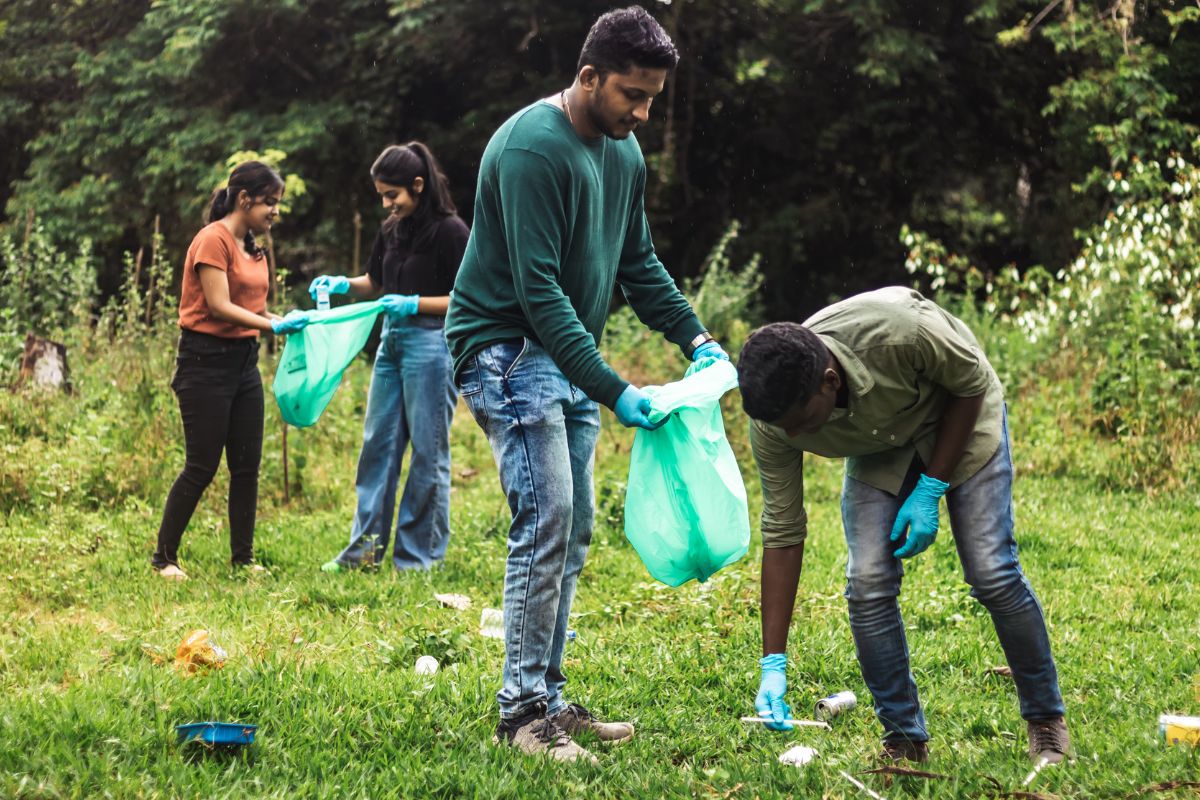Sustainability and Simple Living: How Living with Less Can Contribute to a Greener Future
The Shift Towards Simple Living
As our planet faces numerous environmental hurdles, the choice to embrace simplicity is emerging as a beacon of hope. Sustainability and simple living represent more than just concepts; they reflect a proactive strategy for minimizing our ecological footprint. By simplifying our lives, we not only benefit personally but also contribute to the vitality of the world around us.
Choosing to live with less can lead to numerous advantages:
- Minimal Waste: By consciously cutting down on excess consumption, we contribute to significantly reduced waste, which translates to cleaner landfills and less pollution. For instance, a household that limits single-use plastics can greatly lower their contributions to the annual 28 million tons of plastic waste that the U.S. generates.
- Conserving Resources: A commitment to simplicity often means using fewer natural resources. For example, opting for energy-efficient appliances and reducing water usage helps protect vital ecosystems and promotes sustainability.
- Enhanced Well-being: A focus on essentials encourages mental clarity and well-being. Many individuals report that decluttering spaces leads to a clearer mindset, reducing anxiety and fostering a sense of peace.
Reevaluating our consumption habits empowers us to aid in creating a greener planet. Individuals can effect change through:
- Mindful Purchasing: Selecting high-quality, sustainable products over mass-produced items can cut down on environmental deformities caused by fast fashion and excessive plastic usage. For instance, shopping at local farmers markets not only supports local economies but also reduces the carbon footprint associated with transporting goods long distances.
- Community Engagement: Living simply often comes with a spirit of community. Participating in local clean-up projects or community gardens fosters a sense of connection and collective responsibility for the environment.
- DIY Solutions: Embracing do-it-yourself alternatives—like creating homemade cleaning supplies or growing your own herbs—can drastically reduce reliance on commercial products, further supporting the movement toward eco-friendliness.
As we navigate the journey towards a lifestyle anchored in simplicity, it’s critical to remember that every small action accumulates, contributing significantly to larger environmental goals. Embracing simplicity not only enriches our lives but also strengthens the bond between individuals and the world we inhabit, paving the way for a sustainable future.
DISCOVER: Click here for insights on minimalism in design

Embracing Mindful Consumption
One of the cornerstones of simple living is the practice of mindful consumption, which encourages individuals to critically assess what they buy and why. In a culture driven by consumerism, this shift towards conscious purchasing is not merely a trend; it is a necessity that can have substantial implications for our environment. Consider that the average American generates an estimated 4.9 pounds of waste per person each day. By embracing a mindset centered around simplicity, we can tackle this alarming statistic head-on.
As we navigate our consumer choices, adopting a few key principles can significantly enhance our commitment to sustainability:
- Quality Over Quantity: Choosing durable, high-quality items rather than disposable products reduces waste and leads to long-term savings. A study by the Environmental Protection Agency (EPA) indicates that every item manufactured contributes to greenhouse gas emissions, so investing in sustainable options can result in a lower overall carbon footprint.
- Locally Sourced: Supporting local businesses and farmers fosters economic resilience while minimizing the environmental impact of transporting goods. Purchasing seasonal produce not only tastes better but also helps reduce the reliance on non-renewable resources used in long-distance transportation.
- Secondhand Shopping: Thrift shops and flea markets promote a circular economy by giving products a new life. This practice not only saves money but also reduces the demand for new items, ultimately curbing the waste generated from manufacturing.
Moreover, the impact of minimalism extends beyond individual practices; it reverberates through communities. When individuals come together in the spirit of simplicity, the collective effect on the environment can be profound. Initiatives that promote sharing and borrowing instead of owning can lead to a significant decrease in resource consumption. Car-sharing programs, tool libraries, and community swaps are just a few examples of how communities can cultivate a culture of sharing, thereby reducing the need for excessive production.
In addition to these practices, educating oneself and others about sustainability can play a pivotal role in driving change. Knowledge is power, and understanding the effects of our consumption habits can inspire more individuals to reconsider their lifestyles. Workshops, local meetups, and online forums dedicated to simple living can serve as platforms for sharing effective strategies and fostering a sense of accountability among peers.
Ultimately, the journey towards a sustainable future lies in our everyday choices. By prioritizing mindful consumption and embracing the principles of simple living, we can collectively make strides towards reducing waste and conserving precious resources.
| Advantages of Simple Living | Impact on Sustainability |
|---|---|
| Reduction of Waste | Embracing minimalism leads to lower consumption, reducing landfill waste. |
| Lower Carbon Footprint | Fewer possessions often mean less energy consumption and lower emissions. |
| Improved Mental Health | Simpler living can lead to decreased stress and promote mindfulness. |
| Enhanced Community Engagement | Living with less fosters connections with like-minded individuals focused on sustainable choices. |
The shift towards a lifestyle that emphasizes sustainability and simple living is not merely an individual choice but a transformational lifestyle change that reverberates beyond the self. By consciously consuming less, individuals also significantly diminish their impact on the planet. This intrinsic link underscores how living with less can spearhead initiatives toward a greener future — an ethos that resonates powerfully in today’s world. Moreover, the mental clarity and social connections generated by minimalism not only contribute to personal well-being but also cultivate a communal spirit that values the Earth’s resources. As more people embrace this mindful approach, the collective impact can yield a profound positive shift in environmental conservation and sustainable living practices.
DISCOVER: Click here to learn how simplicity can boost your productivity
The Role of Sustainable Practices in Daily Living
As the pressing concerns of climate change and environmental degradation loom larger, the concept of sustainable practices has garnered increasing attention. These practices are not limited to large corporations or governmental policies; rather, they can be implemented at the individual and community level to contribute significantly to a greener future. By integrating sustainability into the fabric of our daily lives, we can create substantial change.
One critical area where individuals can make a positive impact is through energy conservation. According to the U.S. Energy Information Administration (EIA), residential energy use accounts for approximately 21% of total energy consumption in the United States. By making small adjustments, such as using energy-efficient appliances, switching to LED lighting, and unplugging devices when not in use, consumers can decrease their carbon footprint. Simple actions like these can lead to reduced energy consumption, often resulting in lower utility bills and a greener environment.
Another significant sustainable practice is the movement towards a zero-waste lifestyle. This approach encourages individuals to think critically about their waste output and strive to minimize it through the three Rs: Reduce, Reuse, and Recycle. A zero-waste lifestyle promotes solutions that eliminate waste at its source, advocating for the use of reusable bags, containers, and utensils instead of single-use plastic products. Adopting this lifestyle not only decreases landfill contributions but also challenges the prevailing throwaway culture, fostering a mindset that values resourcefulness.
Gardening is also gaining traction as a sustainable practice embraced by many households. The benefits of growing your own food extend beyond financial savings. Home gardening reduces the carbon emissions associated with transporting food products and allows individuals to cultivate organic produce, which is beneficial both for personal health and the planet. This practice also promotes biodiversity and enhances urban greening efforts, which can lead to improved air quality, urban cooling, and increased habitat for various species.
Additionally, water sustainability should not be overlooked. With water scarcity becoming an increasingly pressing issue, particularly in many parts of the United States, individuals must adopt practices that promote water conservation. Simple measures such as installing low-flow fixtures, collecting rainwater for watering gardens, and replacing lawns with drought-resistant landscaping can drastically reduce water consumption. As the Environmental Protection Agency (EPA) points out, efficient water management is key to tackling the challenges posed by climate change and resource depletion.
Moreover, transportation choices play a critical role in sustainable living. The transport sector is responsible for around 29% of greenhouse gas emissions in the U.S. By opting for public transportation, carpooling, cycling, or walking, individuals can significantly reduce their carbon footprint. Cities across the nation are increasingly investing in infrastructure to support biking and walking, providing safe and convenient options for eco-conscious commuters. The shift towards electric vehicles also represents a potential solution to decrease reliance on fossil fuels, promoting cleaner air and reduced emissions.
In summary, the integration of sustainable practices into everyday life enhances not only personal well-being but also promotes a healthier planet. Every actionable step towards sustainability—be it in energy use, waste management, gardening, water conservation, or transportation—contributes to a collective movement towards a greener future. As more individuals embrace these practices within the framework of simple living, the potential for a significant positive environmental impact expands exponentially.
DISCOVER MORE: Click here to simplify your wardrobe
Conclusion: Embracing Simplicity for a Sustainable Tomorrow
In a world increasingly defined by consumption and waste, the principles of sustainability and simple living offer a refreshing alternative—one that champions a minimalist lifestyle while fostering environmental stewardship. By consciously choosing to live with less, individuals not only improve their own quality of life but also present a compelling solution to some of the most daunting ecological challenges we face today. The cumulative effect of small actions—whether it’s reducing energy use, adopting a zero-waste lifestyle, or engaging in local gardening—can lead to transformative benefits for the planet.
Statistics paint a clear picture: residential energy use contributes significantly to greenhouse gas emissions, while transportation choices account for nearly a third of emissions in the United States. Thus, integrating sustainable practices into our daily routines is no longer merely an option; it is a necessity. Each choice we make—from the food we consume to the methods we use to commute—echoes into our environment and shapes the legacy we leave behind.
Ultimately, adopting a mindset of simplicity invites individuals to reconnect with their values and prioritizes a life rich in experiences over material possessions. As communities rally around shared goals of sustainability, collective action becomes a powerful catalyst for change. In conclusion, the journey toward a greener future starts with each of us. The road may require sacrifices, but those sacrifices lead to a more sustainable existence—not just for ourselves, but for future generations as well. Together, through simple living and sustainable choices, we hold the potential to build a more resilient and environmentally-conscious world.

